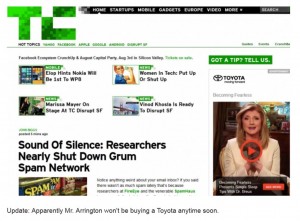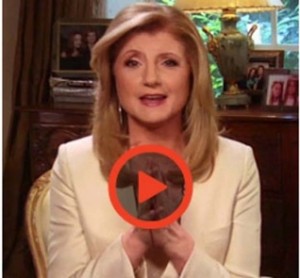In recent years, the Huffington Post has gone from being a minor sideshow on the web to one of the Internet’s most popular sources of news, especially after founder Arianna Huffington sold her firm to wounded tech giant AOL.
But now the news site’s publisher has decided to work on the other side of the aisle, Huffington unexpectedly appearing in an Internet ad for Toyota. The spot, dubbed “Becoming Fearless,” has so far had limited play – running on the website TechCrunch.com — but it is nonetheless raising some serious concerns about the way the Web has blurred the boundaries between editorial and advertising.
“I see it as extremely unusual,” said Charles Eisendrath, director of the Knight Wallace Fellows journalism program at the University of Michigan. “If she’s going to pitch Toyotas it’s a first that I know of in the publishing business.”
The name of the new Toyota ad campaign is actually lifted from publisher Huffington’s book, “On Becoming Fearless…in Love, Work and Life,” and it is part of a broader tie-up between Toyota and the Huffington Post that could further blur the ad/edit barrier by blending editorial into the marketing efforts of the news service’s advertisers.
It’s unclear if the spot featuring Huffington will be used elsewhere. Ironically, Huffington has had her share of trouble with TechCrunch and its own founder Michael Arrington. A dispute over editorial independence was part of the clash that eventually led to Huffington losing control of other news properties in the AOL network.
TechCrunch is one of AOL’s so-called “devil” sites that plant editorial content in a large ad unit. It appears that is becoming more of a model for some of AOL’s operations and the Huffington Post, in particular.
Arianna Huffington is already playing a key role in a Toyota contest seeking the “Toyota Corolla’s Most Fearless Tweet.” Significantly, she and an editor will choose the winners in the promotion.
While publisher Huffington herself may not be reporting day-to-day her close alignment with Toyota has generated some serious concern. It underscores the broader issues raised by the expanding role of the Internet as the source of public news and information.
It has become increasingly difficult to ensure that the line between editorial and advertising is not blurred, media experts warn. TheDetroitBureau.com has regularly received proposals for “guest editorials” and other material that proves to be thinly disguised promotional content for various corporations looking to promote their goods and service. Frequently, ties between writers and sponsors are not disclosed. It is the magazine’s policy not to use such content.
“I’m not concerned, I’m terrified” by the blurring of the lines, said news veteran Eisendrath.


